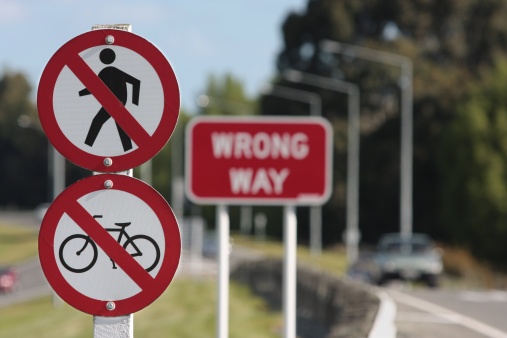Wrong-way crashes have become a serious problem

Wrong-way crashes have become a huge issue in the U.S., and recent tragedies in South Carolina are drawing even more attention to the problem.
A wrong-way accident happens after a motorist drives in the opposite direction of traffic. This can happen on a regular road, one-way roads, in parking lots, or on a divided highway.
What makes a wrong-way crash so dangerous is the likelihood of a head-on collision, a devastating type of car accident that is significantly more destructive than other types of crashes due to the kinetic energy that's released when the front ends of two heavy objects with momentum violently collide.
While head-on crashes are often fatal, those who do survive can suffer brain injuries, spinal cord damage, broken bones, severe burns, internal organ damage, lacerations, and other severe injuries. Some victims also sustain serious and/or fatal injuries by being ejected from the vehicle.
Unfortunately, head-on collisions caused by wrong-way drivers are becoming more frequent in America — and we don't have to look too far to see the effect these crashes are having on communities.
Wrong-way crashes are on the rise
According to the AAA Foundation for Traffic Safety, fatalities from wrong-way crashes on divided highways increased 34% from the period of 2015 to 2018 when compared to the number of deaths that occurred from 2010 to 2014.
Earlier this month in South Carolina, three people died and two others were injured when a truck going in the wrong direction on the U.S. 278 westbound bridge crashed into another vehicle head-on before the driver lost control and went off the bridge into the water. The three victims, all in their 20s, were found dead at the scene.
In April, another motorist died in a wrong-way crash after smashing into two cars on Interstate 26 in Berkeley County. And in Charleston, a drunk driver going the wrong way on Interstate 526 hit a tanker truck head-on, causing a gas leak that closed both sides of the highway.
Why do wrong-way crashes happen?
Experts point to distracted driving (e.g., texting while driving), speeding, old age, and fatigue as contributing factors to wrong-way crashes, but they all agree that the motorists who pose the biggest risk are drunk drivers.
In fact, 60% of all wrong-way crashes in the U.S. involved a driver under the influence of alcohol, prompting AAA and the National Transportation Safety Board to call for countermeasures to mitigate the problem.
“Alcohol impairment is, by far, the single most significant factor in the majority of wrong-way driving crashes, which unfortunately has not changed since the NTSB issued its Wrong-Way Driving special investigation report in 2012,” said Dr. Rob Molloy, NTSB Director of the Office of Highway Safety. “The important work done by AAA shows that we need to redouble our efforts to address this safety hazard.”
The NTSB recommends:
- Having highly visible enforcement operations
- Performing more DUI checkpoints
- Increasing the use of alcohol ignition interlock devices
Drivers older than 70 are also at an increased risk of becoming a wrong-way driver, but analysts say certain measures can be taken to address the problem, such as:
- Driver refresher courses
- More visible signs and signals
- Infrastructure improvements
- Legislation to identify older drivers who may be at risk physically or cognitively
Twenge & Twombley can help you seek justice
If you were seriously injured or a loved one died in a crash caused by a wrong-way driver in South Carolina, you owe it to yourself to call a car accident lawyer to learn your legal rights and options.
Under South Carolina law, you're allowed to take civil action against the at-fault party to recover compensation for your losses, but without the help of an attorney, you might have trouble dealing with the insurance company and calculating the true cost of your damages.
Keep in mind that the insurance company for the at-fault driver has a financial incentive to minimize the value of your claim. They know claims involving serious injuries are a threat to their bottom line, which is why they often delay, dispute, or flat out deny injury claims. And if they do make you an offer to settle, it's a safe bet to assume it's for much less money than what you're actually eligible to recover.
At Twenge + Twombley Law Firm, our attorneys know the best way to keep an insurance company honest is by building a rock-solid case that even they can't ignore. Our goal is to get a settlement that meets all your current and future needs, but if the insurance company won't budge, we are more than happy to take your case to court.
Let us stand by your side and fight for the compensation you deserve. Contact us today for a free case consultation. We proudly serve clients in Beaufort, Hilton Head, Bluffton, and throughout the Lowcountry.
